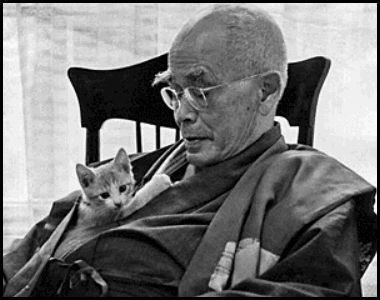D. T. Suzuki: Zen Isn't Self-Limiting
From the chapter "Satori, Or Acquiring a New Viewpoint" in An Introduction to Zen Buddhism (1964) by D. T. Suzuki:
With the God of mysticism there is the grasping of a definite object; when you have God, what is No-God is excluded. This is self-limiting. Zen wants absolute freedom, even from God. "No abiding place" means that very thing; "cleanse your mouth when you utter the word Buddha" amounts to the same thing. It is not that Zen wants to be morbidly unholy and godless, but that it recognizes the incompleteness of a mere name. Therefore when Yakusan (Yueh-shan, 751-834) was asked to give a lecture, he did not say a word, but instead came down from the pulpit and went off to his own room. Hyakujo merely walked forward a few steps, stood still, and then opened out his arms, which was his exposition of the great principle.This is one reason I love the arts. One can express truth without it being reduced to a term, concept, or idea that is by it's very nature incomplete, even misleading. And that's what's great about a relationship with one's cat. Pure feeling can be expressed without having it ruined by words.

Comments
Post a Comment